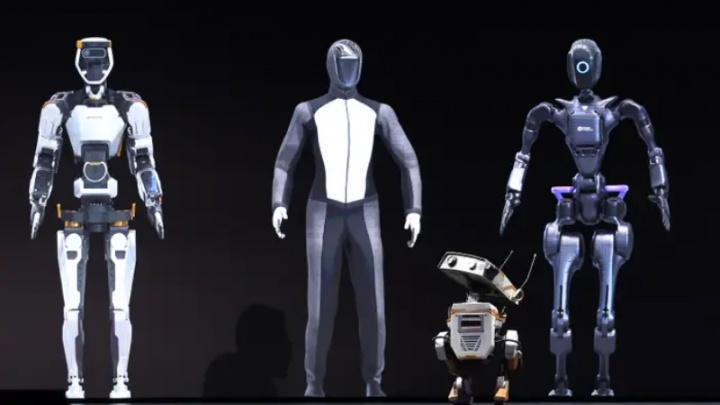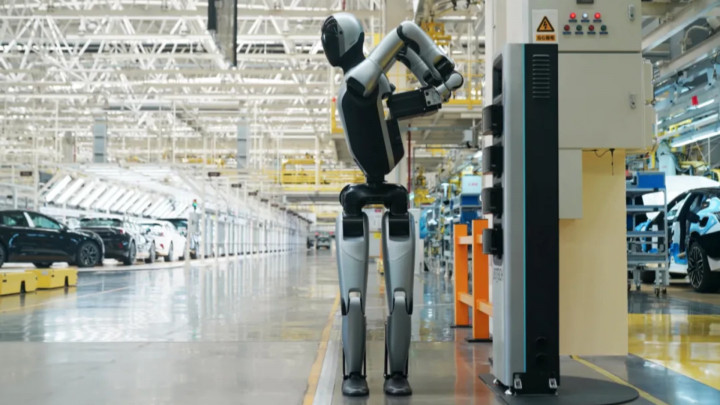Credible Sources for AI and Robotics Information (and Beyond)
The rapid advancement of AI and robotics requires continuous learning. Whether you are a professional actively working in the field or simply curious about these technologies, knowing reliable and up-to-date information sources is essential. In this blog post, I've compiled key resources that can help you navigate the exciting world of artificial intelligence and robotics.

These sources are not only credible but their regularly updated content ensures you can stay informed about the latest developments. While this list is not exhaustive – for instance, the websites of AI software developers and robotics manufacturers are also highly relevant, which I plan to cover in a future post – it provides an excellent starting point for anyone looking to delve deeper into these subjects.
Why Are These Sources Important?
- Credibility: The sources listed are all recognized, trustworthy platforms that publish content often subjected to rigorous peer review or expert scrutiny.
- Timeliness: AI and robotics are fast-evolving fields. These sources are regularly updated, giving you access to the latest information.
- Diversity: The list covers a spectrum from scientific publications and business analyses to technology news, offering a comprehensive overview.
- Expertise/Depth: Many sources specialize specifically in AI and robotics, providing deep professional insights into the latest research and developments.
- Global Perspective: The list includes international databases and publications, ensuring access to global trends and advancements.
List of Sources
Scientific Databases and Search Engines
- Google Scholar
- Free search engine for scholarly literature across many disciplines.
- https://scholar.google.com/
- Semantic Scholar
- AI-powered research tool for scientific literature.
- https://www.semanticscholar.org/
- Web of Science
- Large multidisciplinary subscription-based database indexing scholarly literature, focusing on citation analysis.
- https://clarivate.com/products/web-of-science/
- Scopus
- Large multidisciplinary abstract and citation database of peer-reviewed literature (subscription-based).
- https://www.scopus.com/
Academic Publishers and Digital Libraries
- Springer
- Major global publisher of books, journals, and reference works across science, technology, and medicine.
- https://www.springer.com/
- Elsevier
- Major global publisher of scientific, technical, and medical information products and services.
- https://www.elsevier.com/
- Wiley
- Global publishing company specializing in academic publishing and instructional materials.
- https://www.wiley.com/
- IEEE Xplore
- Digital library providing access to technical literature in electrical engineering, computer science, and electronics, maintained by IEEE.
- https://ieeexplore.ieee.org/
- ScienceDirect
- Elsevier's platform for peer-reviewed literature, hosting journals and books across numerous disciplines.
- https://www.sciencedirect.com/
- ACM Digital Library
- Comprehensive database from the Association for Computing Machinery, a leading resource for computing literature.
- https://dl.acm.org/
- arXiv
- Open-access archive for preprints (non-peer-reviewed scholarly articles) in physics, mathematics, computer science, quantitative biology, quantitative finance, statistics, electrical engineering and systems science, and economics. Crucial for rapid dissemination in AI/ML.
- https://arxiv.org/
AI and Robotics Specific Sources
- Journal of Artificial Intelligence Research (JAIR)
- Leading open-access scientific journal covering all areas of AI.
- https://jair.org
- Artificial Intelligence
- One of the longest-established and most respected journals in the field of AI (published by Elsevier).
- https://www.sciencedirect.com/journal/artificial-intelligence
- Robotics and Autonomous Systems
- Leading journal focusing on robotics, autonomous systems, and machine intelligence (published by Elsevier).
- https://www.sciencedirect.com/journal/robotics-and-autonomous-systems
- International Journal of Robotics Research (IJRR)
- Highly prestigious journal publishing foundational research in robotics (published by SAGE).
- https://journals.sagepub.com/home/ijr
- IEEE Robotics and Automation Society (RAS)
- Leading professional society for robotics and automation professionals, organizing key conferences and publications.
- https://www.ieee-ras.org
- Association for the Advancement of Artificial Intelligence (AAAI)
- Leading international scientific society devoted to advancing the scientific understanding of AI. Organizes the influential AAAI conference.
- https://aaai.org
- Advances in Neural Information Processing Systems (NeurIPS)
- Proceedings from one of the largest and most influential annual conferences in machine learning and computational neuroscience.
- https://neurips.cc/
Market Research and Business Analysis
- Gartner
- Major research and advisory company providing insights primarily for IT and business leaders. Known for its Magic Quadrants.
- https://www.gartner.com/
- Forrester
- Research and advisory firm focusing on the impact of technology on business and consumers.
- https://www.forrester.com/
- IDC (International Data Corporation)
- Leading global provider of market intelligence, advisory services, and events for the IT, telecommunications, and consumer technology markets.
- https://www.idc.com/
- McKinsey & Company
- Global management consulting firm that frequently publishes research and insights on technology's strategic impact, including AI.
- https://www.mckinsey.com/
Technology News and Trends
- MIT Technology Review
- Magazine published by the Massachusetts Institute of Technology, reporting on important new technologies and their impact.
- https://www.technologyreview.com/
- Wired
- Magazine and website focusing on how emerging technologies affect culture, the economy, and politics.
- https://www.wired.com/
- TechCrunch
- Online publication focusing on tech industry news, startups, and venture capital.
- https://techcrunch.com/
Leading University Research Labs (AI & Robotics Focus)
- Massachusetts Institute of Technology (MIT) - Computer Science and Artificial Intelligence Laboratory (CSAIL):
- One of the world's most renowned research labs in computing and AI, with extensive publications covering AI, robotics, machine learning, and computer vision.
- https://www.csail.mit.edu/news
- Stanford University - AI Lab (SAIL):
- Another leading research center focusing on theoretical and practical aspects of AI. Publications span machine learning, NLP, vision, and robotics.
- https://ai.stanford.edu
- Carnegie Mellon University - Robotics Institute (RI):
- Globally recognized powerhouse in robotics research. Their publications cover a wide spectrum, including autonomous systems, computer vision, and human-robot interaction.
- https://www.ri.cmu.edu
- University of California, Berkeley - AI Research Lab (BAIR):
- A leading center conducting research across many areas of AI, including deep learning, machine learning, NLP, computer vision, and robotics.
- https://bair.berkeley.edu/blog
- University of Oxford - Department of Computer Science:
- Conducts world-class research in AI, machine learning, and robotics. Their rich publication list reflects diverse research activities.
- https://www.cs.ox.ac.uk
- California Institute of Technology (Caltech) - Division of Engineering and Applied Science (EAS):
- While broader than just AI/Robotics, Caltech's EAS conducts significant research in control systems, autonomous systems, and related fields, producing high-impact publications.
- https://www.eas.caltech.edu
- ETH Zürich - Department of Computer Science:
- A top European university with outstanding research in AI, machine learning, and robotics. Their publications showcase cutting-edge results.
- https://ethz.ch/en.html
- University of Toronto - Department of Computer Science:
- A prominent research center for AI, machine learning, and robotics, with a rich publication history. Professor Geoffrey Hinton, often called a "godfather of AI," is affiliated with the university and recently received the Nobel Prize in Physics for foundational work relevant to AI.
- https://web.cs.toronto.edu
General Prestigious Scientific Journals
- Nature
- One of the world's most prestigious multidisciplinary scientific journals, occasionally featuring landmark AI/robotics papers.
- https://www.nature.com/
- Science
- Another top-tier multidisciplinary scientific journal (published by AAAS) that sometimes includes significant AI/robotics research.
- https://www.science.org/
- PLOS ONE
- Major open-access, peer-reviewed scientific journal publishing research across all areas of science and medicine.
- https://journals.plos.org/plosone/
Other Useful Resources
- ResearchGate
- Social networking site for scientists and researchers to share papers, ask and answer questions, and find collaborators.
- https://www.researchgate.net/
- World Economic Forum (WEF)
- International organization that often publishes reports on the societal and economic impact of technology, including AI and robotics.
- https://www.weforum.org/
- Harvard Business Review (HBR)
- Leading business magazine frequently covering the business applications and strategic implications of AI and robotics.
- https://hbr.org/
- GitHub
- Essential platform for software development, hosting vast amounts of open-source code, including countless AI and robotics projects and libraries.
- https://github.com/
- Hugging Face
- A crucial community and platform in the AI world, providing access to pre-trained models, datasets, and libraries, particularly strong in Natural Language Processing (NLP).
- https://huggingface.co/
While this list provides a comprehensive overview of key resources, the world of AI and robotics is even broader and more dynamic. For a complete picture, it's also worth paying attention to:
- Manufacturer Websites: AI software creators and robotics companies often provide first-hand information about their latest developments.
- Social Media: Professional groups on LinkedIn, specific Twitter feeds, or relevant subreddits offer rapid and interactive information flow.
- Podcasts: Expert discussions and in-depth analyses in audio format – perfect for learning on the go.
- YouTube Channels: Treasure troves of visual demonstrations, lectures, and tutorials that can make complex concepts easier to grasp.
- Conferences and Webinars: While not daily sources, they offer excellent opportunities to learn about the latest trends and network with experts.
The fields of AI and robotics are constantly evolving, so the list of valuable resources will continue to grow. The key is maintaining curiosity and a commitment to continuous learning.
Share in the comments: What are your go-to sources for AI and robotics information?





